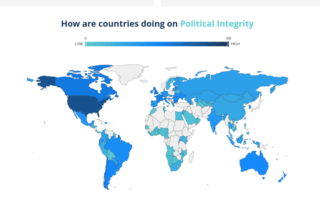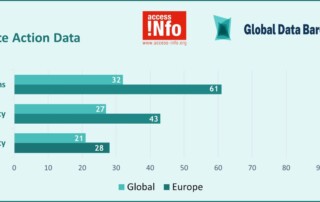EMPODERANDO AL PERIODISMO A TRAVÉS DEL DERECHO DE ACCESO A LA INFORMACIÓN
EL MANUAL ‘LEGAL LEAKS’ AYUDA A PERIODISTAS A OBTENER
INFORMACIÓN USANDO LAS LEYES DE ACCESO A LA INFORMACIÓN
Why is the right of access to information important for journalism?
A Guide for Journalists on How to Access Information
The Legal Leaks Toolkit, developed by Access Info Europe and n-ost, helps journalists access information using Access to Information laws. The Toolkit is available in a generic international version and can be adapted to the legal framework of any country. The existing national versions, translated into local languages, are available below. You can also read more below about our training programme and about how to contact
the Legal Leaks Help Desk.
Why do media experts think access to information is important?
Journalists, activists, and media experts speak about the importance of access to information in their daily work. Watch all interviews here!
That little detail in the relationship between journalists and sources, that little one, is so important that could change the way in which we tell stories.
It is extremely important that there is this mechanism that you can use as a journalist to say «Hang on a minute, you need to give us this, because we have a right to know».
It’s a great way to get stories, it’s a great way to fin out what governments in particular are doing, it’s a great way to find out where money goes, it’s a great way to prove accountability.
The right of access to information is very important for the journalists’ work; it’s important for everyday work, but it’s even more important for investigations.
Journalism is about investigation, it’s about asking questions; but it’s about documents as well, as a proof for questions, as a proof for answers
Basically, I need access to information to do my job as someone who is supposed to ensure the accountability of politicians, of public officials.
Cover photo: European Parliament via Flickr (CC BY-NC-ND 2.0)
ÚLTIMAS NOTICIAS SOBRE EMPODERANDO AL PERIODISMO
Malta lowest-scoring country in Europe for state of data governance
The Shift | 03/12/2022 English - A new tool that aims to measure the state of data around the world has found that Malta is the country with the lowest score out of 21 European countries surveyed, with a score of 36.5 out of 100. Read more...
Alerta sobre limitar la libertad de los medios de comunicación y la de expresión en nombre de la regulación del lobby
Sueldos Públicos - Transparencia y Libertad en la Red | 07/12/2022 Spanish - Access Info ha advertido del riesgo de que algunos gobiernos utilicen las disposiciones propuestas para limitar la libertad de los medios de comunicación y la libertad de expresión en nombre de la regulación de la "influencia" y de garantizar que los funcionarios públicos estén "protegidos de influencias
Access Denied: What now after ECJ restricts access to companies’ ownership data?
Balkan Insight | 06/12/2022 English - When the European Union’s top court, the Court of Justice of the European Union, ECJ, on November 22 struck down a provision in money-laundering legislation that guarantees the public full access to registers of company ownership, it was not unexpected. But it was still greeted with outrage by NGOs and the media alike. Read
Missing Data Opens the Door to Corruption
Madrid, 9 December 2022 – On the occasion of International Anti-Corruption Day, Access Info is calling on European governments to do more to ensure that the data needed for preventing corruption is both collected and made public. In the wake of the shock ruling from the Court of Justice of the European Union, which has already suspended access to
No Biodiversity: Europe’s Missing Climate Action Data
Madrid, 8 December 2022 – As the UN Biodiversity Conference opens in Montreal, Canada, Access Info has raised concerns about the shortage of biodiversity data with the Global Data Barometer findings being only 43% for biodiversity data in European countries, and only 27% globally. Our research found that no biodiversity data is published online in six (6) European countries,
Not all Expression is Lobbying
Submission to OECD Consultation on Lobbying and Influence Madrid, 6 December 2022 – In its analysis of the draft OECD Recommendation on the regulation of lobbying and influence, Access Info has warned of the risk of some governments using the proposed provisions to limit media freedom and freedom of expression in the name of regulating “influence” and ensuring that



